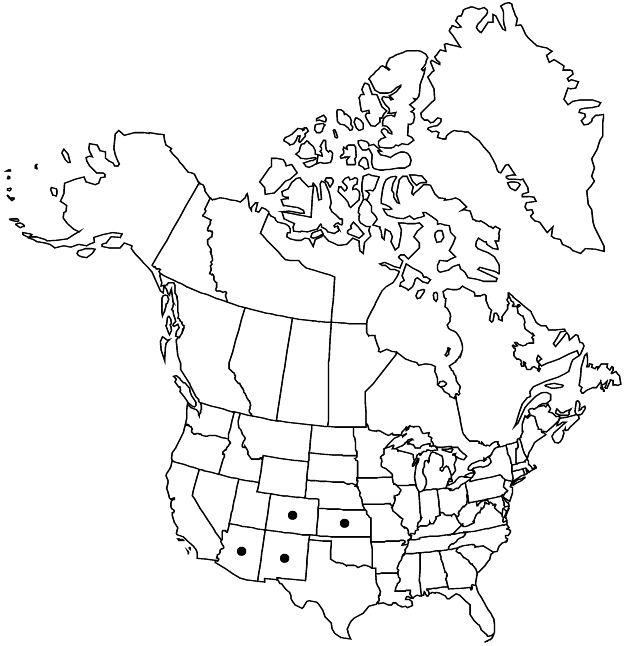Difference between revisions of "Sphaeralcea fendleri"
Smithsonian Contr. Knowl. 3(5): 21. 1852.
FNA>Volume Importer |
FNA>Volume Importer |
(No difference)
| |
Revision as of 22:46, 16 December 2019
Plants perennial. Stems erect or ascending, usually gray to gray-green or green, sometimes purple to black, (2–)4–7(–10) dm, sparsely to densely canescent or hirsute. Leaf blades green or gray to gray-green, lanceolate to triangular, shallowly to deeply 3-lobed, (1.5–)3–7 cm, not rugose, base truncate to cuneate, margins crenate to dentate, surfaces hirsute or sparsely to densely stellate soft-pubescent. Inflorescences paniculate, narrow, usually crowded, tip leafy or not; involucellar bractlets green to tan. Flowers: sepals 4.5–6(–9) mm; petals red-orange or lavender, 8–13 mm; anthers yellow. Schizocarps cylindric to conic; mericarps 9–16, 4–5.5 × 2–2.5 mm, chartaceous, nonreticulate dehiscent part 70–80% of height, tip reflexed and cuspidate, indehiscent part not wider than dehiscent part, sides faintly, very finely reticulate, tips reflexed. Seeds 2 per mericarp, black, pubescent.
Distribution

sw United States, n Mexico.
Discussion
Varieties 3 (3 in the flora).
Selected References
None.
Lower Taxa
Key
| 1 | Leaf blade surfaces distinctly hirsute | Sphaeralcea fendleri var. venusta |
| 1 | Leaf blade surfaces soft-pubescent or sparsely pubescent | > 2 |
| 2 | Leaf blade surfaces sparsely pubescent, appearing green; petals red-orange. | Sphaeralcea fendleri var. fendleri |
| 2 | Leaf blade surfaces densely soft white-pubescent; petals usually lavender. | Sphaeralcea fendleri var. albescens |